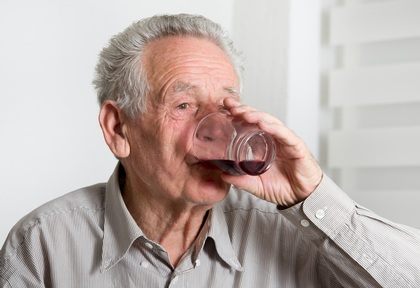Care home specialises in 'wet' care for alcoholics
Oak Mount Care Home is one of the UK’s only care homes to provide care for men who are dependent on alcohol and crucially it does not restrict the amount of alcohol consumed by residents.

Oak Mount allows residents to continue drinking to reduce harm to themselves and their fellow residents without risking being abused, both physically and mentally if they were left homeless on the streets.
The idea of 'wet' care homes is controversial as some disagree with Government funding being spent on giving free alcohol to alcoholics.
However care home manager, Tracy Ellis, claims living in a 'wet' care home can give residents, many of whom have been living on the streets, a sense of security and stability which often makes them cut down on their drinking.
“There are generally two to three staff on duty at any time, we do not restrict alcohol intake, once clients have a sense of security and stability after moving to the home they tend to stabilise and often reduce their drinking. All clients access GP and other health services and we provide nutritious balanced meals on site," she says.
Ironically, when residents do start reducing their drinking, the 'wet' environment of Oak Mount is not the best place for them.
“A client who wanted to stop drinking would be more appropriately supported in a facility with a recovery and rehab ethos. It would be very challenging for a client in our environment to try to undertake a programme of recovery given that the other members of the community in which he lived would continue to consume alcohol. Should one of our clients wish to stop drinking we would fully support them to find the right accommodation to move on," adds Ms Ellis.
Men are twice as likely as women to abuse or become dependent on alcohol, with 5,473 men dying from alcohol related causes in the UK in 2012, according to the charity Drinkaware
Five per cent of men in the UK are 'Higher risk' drinkers – someone who drinks more than 50 units a week.
The Oak Mount Care Home service was established in 1993 as part of the non-profit Horton Housing Group, where it provided daily shelter for homeless drinkers in the Bradford area.
Now the home provides care for single men with a history of chronic alcohol dependency. Clients are usually homeless and often require extra support due to their physical and mental health needs. Ranging between the ages of 40 and 70 years old, many have been at the home for a number of years and often remain there until the end of life.
Home manager Tracy Ellis says: “We have a staff team of 13 working across 24 hours, seven days, our team includes support workers, care staff, a cook and manager.
“I am a social worker with a mental health background. The staff come from a wide variety of social care backgrounds and we are all trained in working with our client group.
“We are able to support clients who have physical health problems but their primary need would have to be around their alcohol use rather than a primary physical health need.”
Situated in the Mannginham area of the city of Bradford, Oak Mount receives a steady flow of referrals and was established to address a recognised problem of homeless men with alcohol dependency in the local area.
Ms Ellis adds: “Clients are from a range of backgrounds, some have been street homeless and others have had tenancies which have broken down. Horton Housing provides over thirty different services across Bradford, Calderdale, Kirklees and North Yorkshire, including Bradford Day Shelter which opened in 1976, and is still going strong providing drop-in services for homeless people in the district.”
Located within a cul-de-sac and surrounded by residential housing, clients are actively encouraged to access their local community.
Ms Ellis says: “We work with clients on individual support plans so their care and support is person centred. We do organise group events for special occasions such as Christmas, we support clients with family visits and with accessing community activities and events.”
The home features 12 en-suite rooms and residents have access to a shared kitchen, lounge, dining room and pool table, fully accessible with grab rails and ramps throughout to both aid residents with disabilities and those who may need extra support when intoxicated.
Recent figures published by King’s College London revealed that around 20 per cent of older people drink to unsafe levels, the equivalent of more than 21 units for men and more than 14 for women.

Speaking about the relationship between the home’s staff team, currently mostly made up of women and the residents, Ms Ellis says: “We develop positive working relationships between staff and clients and all staff are trained in managing violence and aggression techniques.
“Staff are trained in de-escalation. Clients are generally very respectful of staff and value the home and this is generally evidenced in their behaviour. Incidents do occur but the majority are dealt with by staff asking clients to go leave communal areas.
“Our intention hasn’t been to recruit an all female team, we have had male workers in the past and would do so again.”
Residents within the home receive a weekly allowance to spend as they wish and are encouraged to access all aspects of the local community as they carry out personal shopping.
While the home offers unique care options for men who are alcohol dependent, Ms Ellis would like to see the same model being applied in other areas of the UK, ensuring clients are monitored and support is provided, physically, mentally and emotionally.
Latest Features News
 25-Nov-19
2019 Election: Boris Johnson leaves social care in 'too difficult box' but Labour vows to end 'crisis'
25-Nov-19
2019 Election: Boris Johnson leaves social care in 'too difficult box' but Labour vows to end 'crisis'
 18-Oct-19
Podcast: Wendy Mitchell and dementia: 'My biggest fear is not knowing who my daughters are'
18-Oct-19
Podcast: Wendy Mitchell and dementia: 'My biggest fear is not knowing who my daughters are'
 27-Sep-19
Exclusive: Care minister backs care workers' call for time off to grieve and attend funerals
27-Sep-19
Exclusive: Care minister backs care workers' call for time off to grieve and attend funerals
 19-Sep-19
Podcast: Gyles Brandreth says poetry helps ward off dementia
19-Sep-19
Podcast: Gyles Brandreth says poetry helps ward off dementia
 30-Aug-19
Edinburgh Fringe funnyman joins comics facing toughest audience at care home gig
30-Aug-19
Edinburgh Fringe funnyman joins comics facing toughest audience at care home gig